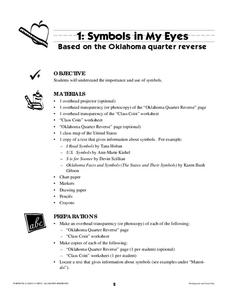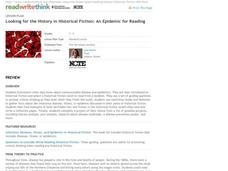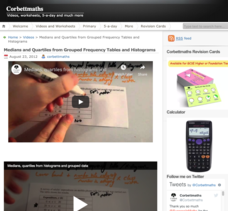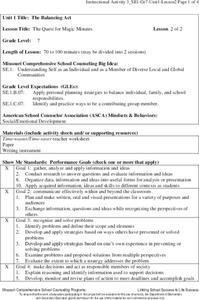Facing History and Ourselves
Identity Charts
Many factors shape the identity of persons, communities, and even nations. Tweens and teens have an opportunity to consider the many aspects of identity as they create a graphic that reflects who they are. Class members first brainstorm...
Facing History and Ourselves
Closing Challenge
The future can be yours to see with a bit of planning. That's the takeaway from a routine that asks participants to first brainstorm a list of personal and academic goals. Individuals then select one to focus on for the week, identify...
American Farm Bureau Foundation for Agriculture
Shapes in Agriculture
It's time to get crafty with shapes! Your future farmers demonstrate their geometric ability by building a farm using triangles, circles, rectangles, and squares. But first, scholars take part in a brainstorm session inspired by their...
Missouri Department of Elementary
Are You Balanced?
Balance scales create a strong visual of how an individual prioritizes one's self alongside their commitments to the community, school, and home. Scholars complete a graphic organizer then discuss their findings with their peers. A...
Council for the Curriculum, Examinations and Assessment
Feelings and Emotions
The focus of the second session in this SPECS unit is on learning how to identify, and then appropriately express and manage feelings.
Council for the Curriculum, Examinations and Assessment
Relationships and Sexuality
Developing close personal and romantic relationships requires its own set of skills. This session focuses on helping teens develop behaviors and strategies for dealing with romantic relationships, rather than on sharing personal...
Council for the Curriculum, Examinations and Assessment
Managing Change
Learning to embrace the opportunities and challenges change presents is the focus of the exercises and activities in this fifth session of a 10-lesson course on Social, Physical, Emotional, Cognitive and Spiritual (SPECS) health. The...
Amani Project
Teach the Mood Meter
The third activity from the Amani Project has youths create a Mood Meter. The colorful meter, divided into red, yellow, blue, and green squares, lets participants indicate not only how they are feeling but also permits them to indicate...
ReadWriteThink
Living the Dream: 100 Acts of Kindness
Inspire kindness in and out of school with a lesson that challenges scholars to perform 100 acts of kindness during the time between Martin Luther King Jr. Day to Valentine's day. Leading up to a celebration of friendship, learners...
Sharp School
The Jungle Project: Creating a Magazine
To conclude a study of Upton Sinclair's The Jungle, groups create a multi-media magazine in which they investigate one aspect of the foods industry. The packet details the requirements for the project, and includes rubrics for assessing...
Facing History and Ourselves
Taking a Stand: Models of Civic Participation
How does an individual take a stand for a principle or belief? what skills are required to do so? What are the challenges and risks in doing so? Class members study examples of individuals engaging in such activities and then identify...
Annenberg Foundation
A Nation Divided
Can a presidential election cause a civil war? Learners research the events surrounding the presidential election of 1860 in a lesson that explores America's history. Using maps, videos, and primary sources, they uncover, brainstorm, and...
US Mint
Symbols in My Eyes
Explore the hidden meanings behind the images on US currency with this elementary school lesson on symbolism. Starting with a class discussion about symbols, children go on to brainstorm different objects that represent the Unites States...
ReadWriteThink
Word Recognition Strategies Using Nursery Rhymes
As a class, scholars read the poems, Humpty Dumpty, Peter, Peter, Pumpkin Eater, and Jack and Jill, in order to identify words with the same ending sound. Using their rhyming skills, learners brainstorm additional words from word...
ReadWriteThink
Looking for the History in Historical Fiction: An Epidemic for Reading
Combine informational reading skills with fictional text in an innovative historical fiction lessons. After reading a fictional text related to diseases, class members read non-fictional text to gain knowledge about specific infectious...
Maryland Department of Education
The Concept of Diversity in World Literature Lesson 1: Unit Introduction
To launch a unit study of the concept of diversity in World Literature, class members compare Chinua Achebe's essay, "An Image of Africa: Racism in Conrad's Heart of Darkness" and Richard Rodriguez's essay, "The Chinese in All of Us: A...
Corbett Maths
Medians and Quartiles from Grouped Frequency Tables and Histograms
Determine medians within a group. Given data represented as a frequency table of grouped data, the video demonstrates finding an estimation for the median. After finding the group where the median resides, the presenter uses a formula to...
Missouri Department of Elementary
“Re-Solutioning”: Practice Brings Out Our Best
Seventh graders create and perform a skit that demonstrates their conflict resolution skills. They begin by examining the process of crafting a performance and review what they have learned about conflict resolution. Next, they...
Missouri Department of Elementary
The Quest for Magic Minutes
A "Magic Minute" activity asks class groups to develop a commercial to advertise a way to turn a time-waster into a time-saver. Ad groups begin by brainstorming time-wasters and then problem-solve was to turn them into time-savers. After...
Edgate
Why Map a Map?
After brainstorming reasons why Native Americans mapped their lands, your young critical thinkers will work together to review their ideas and determine the definition of a map. With today's extensive use of mapping technology and GPS...
Consortium for Ocean Science Exploration and Engagement (COSEE)
One Ocean: It Matters!
Here is the first of four poignant lessons on how humans and oceans interact, even if people live far from the coast. This particular lesson also examines studies that are taking place in Antarctica of how climate change is affecting the...
Annenberg Foundation
America's History in the Making: Classroom Applications Three
How can primary sources bring history to life? Scholars create detailed lesson plans on the late nineteenth and early twentieth centuries in American history. The 17th installment of a 22-part program exploring American history examines...
Annenberg Foundation
Reconstructing a Nation
Think back to the aftermath of an family dispute. The awkwardness of having to make up, get along, and move forward can be very difficult. The tenth lesson of a 22-part series on American history examines the Reconstruction Era following...
Annenberg Foundation
Mapping Initial Encounters
Picture someone's excitement of seeing a horse for the first time. How about a cow? The Columbian Exchange changed life for not only Native Americans, but also for Europeans and the entire world. The second lesson of a 22-part series...

























